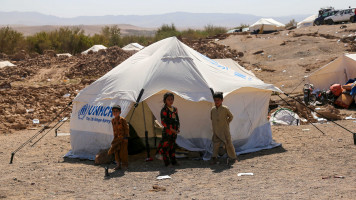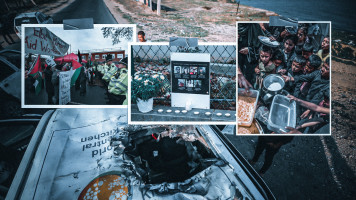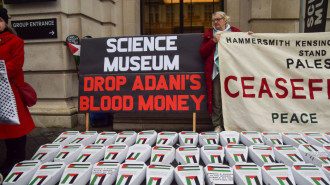
A meat-free Ramadan in Damascus as prices soar

The abject state of the economy in Damascus, the Syrian capital, and across the country more broadly, has changed many of the traditional consumption patterns that used to be customary during Ramadan, as people adapt their spending in order to live within their means.
In light of economic stagnation, soaring inflation, and continuous price hikes, the meagre income of those fortunate enough to work is now not enough to buy the basics, let alone increase spending which would usually happen during the "generous month."
Meat-free Ramadan for many
While Damascene households were once renowned for the lavish and abundant iftar dinners they would prepare, the steady deterioration in living conditions has led to stark changes to dishes being served across the city during Ramadan.
Certain meals have been swapped with others – less costly to make – and specific ingredients are being removed altogether from families' Ramadan menus. Most noticeably, many families are going without meat and poultry.
"In light of economic stagnation, soaring inflation, and continuous price hikes, the meagre income of those fortunate enough to work is now not enough to buy the basics"
Damascus, like other Syrian cities, has seen massive price rises when it comes to every kind of meat, especially lamb, but also chicken.
The price for a kilo of lean lamb meat has risen to 110,000 Syrian pounds (SYP) (equivalent to approximately $15) – a cost exceeding the total monthly wage of workers in the public sector, whose salaries have lost almost 80 percent of their value since the start of the civil war 2011.
The price rise is also a 120 percent hike compared to the cost of lamb last Ramadan. Likewise, a kilo of chicken now costs 25,000 Syrian lira, which means 2 kg of chicken, which a small family would need to prepare an iftar meal, would cost them 50,000 lira. $1 is equivalent to around 7,500 SYP (black market rate).
The storm of rocketing prices hasn't been confined to meat – it includes all essential items and staples, not only foods associated with Ramadan.
A kilo of long grain rice has climbed to 18,000 SYP, and the price of a kilo of sugar to 7,000 SYP.
|
|
Amira Akkad is from Damascus and has four children. She said to Al-Araby Al-Jadeed, The New Arab's Arabic-language sister edition: "Over the last decade, we have endured many difficult years, but this year is the hardest. I have never had to prepare such a frugal meal for Ramadan as I had to this time. But, unfortunately, we have to adapt."
She says the family won't be buying lamb this Ramadan, as “the price for a kilo is equivalent to three-quarters of my husband's monthly wage.” Her husband is a civil servant.
Akkad sighs and adds with a cynical smile: "My children will be lucky to have chicken this month, though their father might agree to spend half his salary for them to buy chicken."
"Many Syrians today are not thinking about luxuries like eating meat and chicken — their concern is for them and their families to survive starvation"
Saying goodbye to traditional Ramadan dishes
Secondary school teacher Samer also lives in Damascus. He spoke about the effect of the economic chaos on traditional dishes that had long been associated with Ramadan: "In Damascus, we have a custom, at the start of Ramadan we prepare a few dishes which are called al-tabkhat al-baydaa (white dishes), with which we welcome the blessed month. These dishes include Shakriya and Shishbarak, which are made with meat, yoghurt and rice. However, this month, we have been deprived of these foods, as the cost of just one of these dishes, for a family of five, would cost double my monthly salary."
Economist Younes al-Karim explained that increasing financial pressures on consumers during Ramadan have become a yearly occurrence over the past few years due to the blessed month coinciding with a number of other demands being placed on families – such as preparing their children for going back to schools and buying essentials for that – as the opening of schools for the new term has taken place in Ramadan over the last few years.
He says however that 2023 is different, and the economic situation has developed another aspect. This is because Syrians' drop in purchasing power has in effect become the new normal, and Syrians are no longer hearing government promises that the economic situation is going to improve.
Al-Karim adds that the policies pursued by the government have exacerbated the suffering of the consumers, like opening the doors wide for the traders [to control prices], and the official decision to raise the dollar exchange rate. The situation has also led to a rise in reliance on credit to buy items.
Al-Karim emphasised that many Syrians today are not thinking about luxuries like eating meat and chicken – their concern is for themselves and their families to survive starvation which today has become a genuine danger for many, especially those who don’t have relatives who have managed to move abroad and who can send money back.
This is an edited translation from our Arabic edition. To read the original article click here.
Translated by Rose Chacko
This article is taken from our Arabic sister publication, Al-Araby Al Jadeed and mirrors the source's original editorial guidelines and reporting policies. Any requests for correction or comment will be forwarded to the original authors and editors.
Have questions or comments? Email us at: info@alaraby.co.uk



